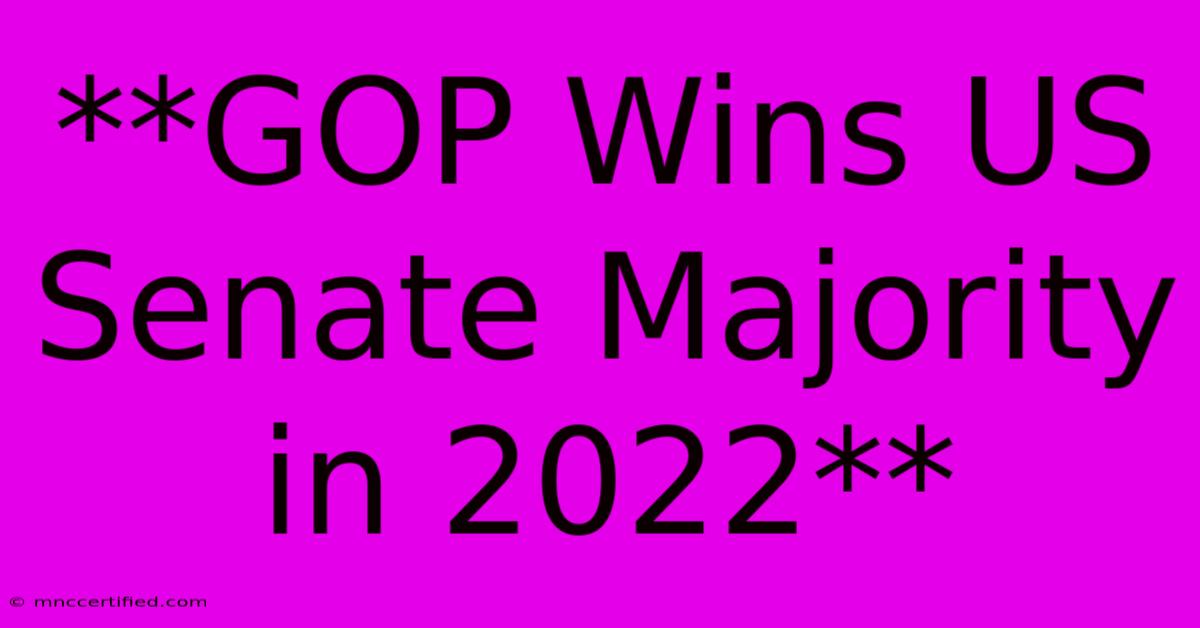**GOP Wins US Senate Majority In 2022**

Table of Contents
GOP Wins US Senate Majority in 2022: What It Means for the Future
The 2022 midterm elections brought a major shift in power in the US Senate, with Republicans securing a narrow majority after years of Democratic control. This victory has significant implications for the political landscape, potentially impacting everything from legislation to presidential appointments.
A Close Race and a Tight Margin
While the GOP gained control of the Senate, the victory was far from a landslide. Republicans flipped a handful of key seats, primarily in states like Pennsylvania, Arizona, and Nevada, while defending existing seats in states like Wisconsin and Ohio. The final margin of victory was narrow, with Republicans securing 51 seats to the Democrats' 49.
Key Races and the Impact on the Senate
Several races proved pivotal in determining the Senate majority. Here are a few key examples:
- Pennsylvania: Republican Mehmet Oz defeated Democrat John Fetterman in a tight race, flipping the seat from blue to red. This victory was seen as crucial for Republicans, as Pennsylvania had been a Democratic stronghold in recent years.
- Arizona: Republican Blake Masters won a hard-fought battle against Democratic incumbent Mark Kelly. This victory was particularly significant because it marked a return to the GOP for a state that had trended blue in recent elections.
- Nevada: Republican Adam Laxalt defeated incumbent Democrat Catherine Cortez Masto in a close race, another crucial pick-up for the GOP.
These victories demonstrate the strength of the Republican Party's message and the potential for continued success in future elections.
Implications for Legislation and Policy
The GOP's control of the Senate will have a direct impact on legislation and policymaking. Republicans are expected to focus on issues such as:
- Economic policy: Republicans are likely to prioritize policies aimed at reducing inflation and boosting economic growth, potentially including tax cuts and deregulation.
- Energy policy: The party is expected to push for increased domestic energy production and a rollback of environmental regulations, particularly those related to climate change.
- Social issues: Republicans are likely to focus on issues such as abortion, gun control, and immigration, potentially leading to a more conservative approach to these topics.
These priorities will likely lead to significant clashes with the Democratic-controlled House of Representatives, potentially resulting in legislative gridlock or a focus on bipartisan initiatives.
Impact on Presidential Appointments
The Senate plays a crucial role in confirming presidential appointments, including judges, cabinet members, and other key administration officials. With Republicans controlling the chamber, the confirmation process is likely to become more challenging for the Biden administration.
This could lead to delays or even the blocking of certain appointments, potentially impacting the President's agenda and ability to enact his policies.
The Road Ahead
The GOP's victory in the 2022 midterm elections marks a significant shift in the political landscape. The narrow majority in the Senate gives Republicans a powerful platform to advance their agenda, while also raising the stakes for future elections.
The coming years will see a continued battle for control of the Senate, with both parties looking to capitalize on the opportunities presented by the current political climate.
Keywords: 2022 midterm elections, US Senate, GOP, Republican, Democrat, Senate majority, Pennsylvania, Arizona, Nevada, legislation, policy, economic policy, energy policy, social issues, presidential appointments, confirmation process, Biden administration, political landscape

Thank you for visiting our website wich cover about **GOP Wins US Senate Majority In 2022** . We hope the information provided has been useful to you. Feel free to contact us if you have any questions or need further assistance. See you next time and dont miss to bookmark.
Featured Posts
-
Wearable Breast Pumps Covered By Insurance
Nov 07, 2024
-
Criminal Justice Reform Wins In California Prop 36
Nov 07, 2024
-
Republicans Control Senate Whats The Impact
Nov 07, 2024
-
Land To Luxury Us Presidents Wealth
Nov 07, 2024
-
Inaki Pena Gavi Flicks Strategy
Nov 07, 2024